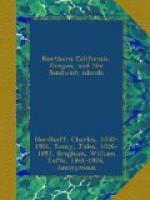What there is happy about his life he owes to the fine climate and the missionaries. The latter have given him education enough to read his Bible and newspaper, and thus to take some interest in and have some knowledge of affairs in the world at large. They and their successors, the political rulers, have made life and property secure, and caused roads and bridges to be built and maintained; and the Hawaiian is fond of moving about. The little inter-island steamer and the schooners are always full of people on their travels; and as they do not have hotel bills to pay, but live on their friends on these visits, there is a great deal of such movement.
It would hardly do to compare the Hawaiian people with those of New England; but they will compare favorably in comfort, in intelligence, in wealth, in morals, and in happiness with the common people of most European nations; and when one sees here how happily people can live in a small way, and without ambitious striving for wealth or a career, he can not but wonder if, after all, in the year 2873, our pushing and hard-pushed civilization of the nineteenth century will get as great praise as it gets from ourselves, its victims.
[Illustration: HAWAIIANS EATING POI.]
CHAPTER VI.
COMMERCIAL AND POLITICAL.
Commercial relations form and foster political alliances, especially between a weak state and a strong one. The annual report for 1872 of imports and exports, made up by the Collector-general of the Hawaiian Kingdom, shows how completely the Islands depend upon the United States.
Of 146 merchant vessels and steamers entered at Hawaiian ports during 1872, 90 were American, only 15 were English; 6 were German, 9 belonged to other nations, and 26 were Hawaiian. Of a total of 98,647 tons of shipping, 73,975 were American, 6714 Hawaiian, and but 7741 British. Of 47 whaling vessels calling at Island ports during the year, 42 were American, 2 Hawaiian, and 3 British.
Of a little less than 16,000,000 pounds of sugar exported during the same year, 14,500,000 were sent to the United States; of 39,000 pounds of coffee 34,000 were sent to us; of 1,349,503 pounds of rice and paddy exported, 1,317,203 pounds came to the United States. All the cotton, all the goat-skins, nearly all the hides, all the wool, the greater part of the peanuts and the pulu, in short, almost the whole exports of the Islands, are sent to the United States.
On the other hand, of $1,234,147, the value of duty-paying merchandise imported during 1872 into the Islands, $806,111 worth came from the United States, $155,939 from Great Britain, and $205,396 from Germany. Besides this, of the total value of bonded goods, $349,435, the large amount of $135,487 was brought from sea by whalemen, almost all of whom were Americans; and $99,567 worth was goods from the United States; or $235,000 of American products against $21,801 of British, and $23,904 of German importation, in bond.




